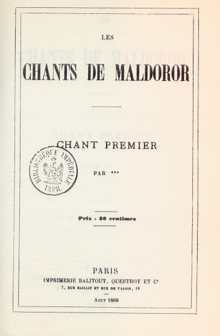
Back أناشيد مالدورور Arabic Песните на Малдорор Bulgarian Els cants de Maldoror Catalan Zpěvy Maldororovy Czech Die Gesänge des Maldoror German Τα άσματα του Μαλντορόρ Greek Los cantos de Maldoror Spanish نغمههای مالدورور Persian Les Chants de Maldoror French Canti di Maldoror Italian
 Cover of the first French edition | |
| Author | Comte de Lautréamont (Isidore Lucien Ducasse) |
|---|---|
| Original title | Les Chants de Maldoror |
| Translator |
|
| Language | French |
| Genre | Poetic novel |
| Publisher | Gustave Balitout, Questroy et Cie. (original) |
Publication date | 1868–69 1874 (complete edition, with new cover) |
| Publication place | France |
| Media type | |
| OCLC | 457272491 |
Original text | Les Chants de Maldoror at French Wikisource |
Les Chants de Maldoror (The Songs of Maldoror) is a French poetic novel, or a long prose poem. It was written and published between 1868 and 1869 by the Comte de Lautréamont, the nom de plume of the Uruguayan-born French writer Isidore Lucien Ducasse.[1] The work concerns the misanthropic, misotheistic character of Maldoror, a figure of evil who has renounced conventional morality.
Although obscure at the time of its initial publication, Maldoror was rediscovered and championed by the Surrealist artists during the early twentieth century.[2] The work's transgressive, violent, and absurd themes are shared in common with much of Surrealism's output;[3] in particular, Louis Aragon, André Breton, Salvador Dalí, Man Ray, and Philippe Soupault were influenced by the work.[a] Maldoror was itself influenced by earlier gothic literature of the period, including Lord Byron's Manfred, and Charles Maturin's Melmoth the Wanderer.[4]
- ^ Comte de Lautréamont (1978). Maldoror and Poems. Translated by Knight, Paul. New York: Penguin. pp. 7–10. ISBN 978-0-14-044342-4.
- ^ McCorristine, Shane (January 2009). "Lautréamont and the Haunting of Surrealism". academia.edu: 36–41.
- ^ Gascoyne, David (1935). A Short Survey of Surrealism. Psychology Press. p. 10. ISBN 978-0-7146-2262-0. Retrieved 2 May 2015.
- ^ Knight, pp. 16-19.
Cite error: There are <ref group=lower-alpha> tags or {{efn}} templates on this page, but the references will not show without a {{reflist|group=lower-alpha}} template or {{notelist}} template (see the help page).